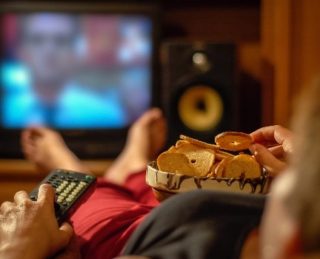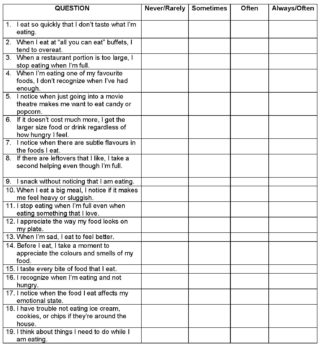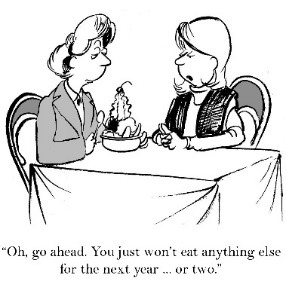
Does this scenario sound familiar to you? You sit down to watch TV. During the commercial break you hear the bag of chips calling to you from the kitchen cupboard. You decide to have a handful and return to watching TV. Next commercial break you do the same thing, but this time you take the bag back to the couch. By the next commercial, the bag is empty and you wonder how that could be.
This is one of many examples of mindless eating and you are probably not aware that it is happening. Mindless eating happens when you are distracted by something else so that all of your attention is not on what you are eating or how you are eating. When distracted, we are far more likely to shift into autopilot and overeat and this is one very common reason for weight gain.

Still not convinced? Clinical studies have examined the effectiveness of awareness and eating. For example, Timmerman and Brown (2012) conducted a study on middle-aged women who frequently ate out at restaurants. The intervention involved teaching the women how to be more “aware” of their choices, hunger, fullness and mindless eating behaviour. The result? The women ate 300 calories less each day.
So, how many times a day are you eating mindlessly? Take a look at this list and check the ones that you regularly engage in.
- Driving
- Making dinner
- Desktop dining
- Reading a magazine
- Cleaning up after a meal
- Watching a movie at the cinema
- Talking on the phone
- Eating when you are bored, stressed or anxious
- Emptying your plate even though you are full
- Attending a party or social event
Almost everyone eats mindlessly at one time or another. But if you are struggling with your weight, then it is crucial to know how often you are eating mindlessly and then to do something about it.
Here are 7 tips for eating more mindfully:
- Eat for the first 5 minutes of every meal in silence
- Designate a place in your home where the only thing that you do is eat
- Eat with chopsticks
- Don’t eat from a carton – take a serving size and put it on a plate/bowl
- Make food hard to get – most of us won’t work too hard to eat
- Pretend you are a food critic and you will have to describe how the food looks, smells, feels, sounds, and tastes
- Try taking the first 4 sips of hot tea or coffee with full attention
There are many opportunities in a day to practice these tips and we know that mindful eating gets easier and more effective with practice. You will eventually feel more satisfied when you eat.
Enjoy your meal!!!!
![]()
Timmerman, G.M. & Brown, A. (2012). The effect of a mindful restaurant eating intervention on weight management in women. Journal of Nutrition Education and Behavior, 2012 Jan-Feb;44(1):22-8. doi: 10.1016/j.jneb.2011.03.143.



 In fact, most of us likely practice the opposite of mindful eating, we are more likely engaging in mindless eating. We lack awareness of how we fill our plate, or our portion size. We eat in front of the TV or computer, and we do not notice cues in our body signaling us that we are full. With mindless eating, most of us can consume an unnoticed 200-300 calories each day, which overtime can lead to unwanted weight gain. Consider this: have you ever been eating chips and went to put your hand in the bag, only to find it empty? Or have you ever eaten the last piece of crusty, dried out chocolate cake even though it tasted like cardboard?
In fact, most of us likely practice the opposite of mindful eating, we are more likely engaging in mindless eating. We lack awareness of how we fill our plate, or our portion size. We eat in front of the TV or computer, and we do not notice cues in our body signaling us that we are full. With mindless eating, most of us can consume an unnoticed 200-300 calories each day, which overtime can lead to unwanted weight gain. Consider this: have you ever been eating chips and went to put your hand in the bag, only to find it empty? Or have you ever eaten the last piece of crusty, dried out chocolate cake even though it tasted like cardboard?






